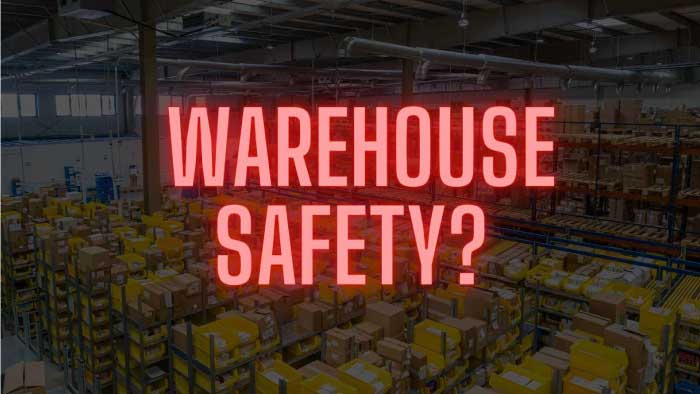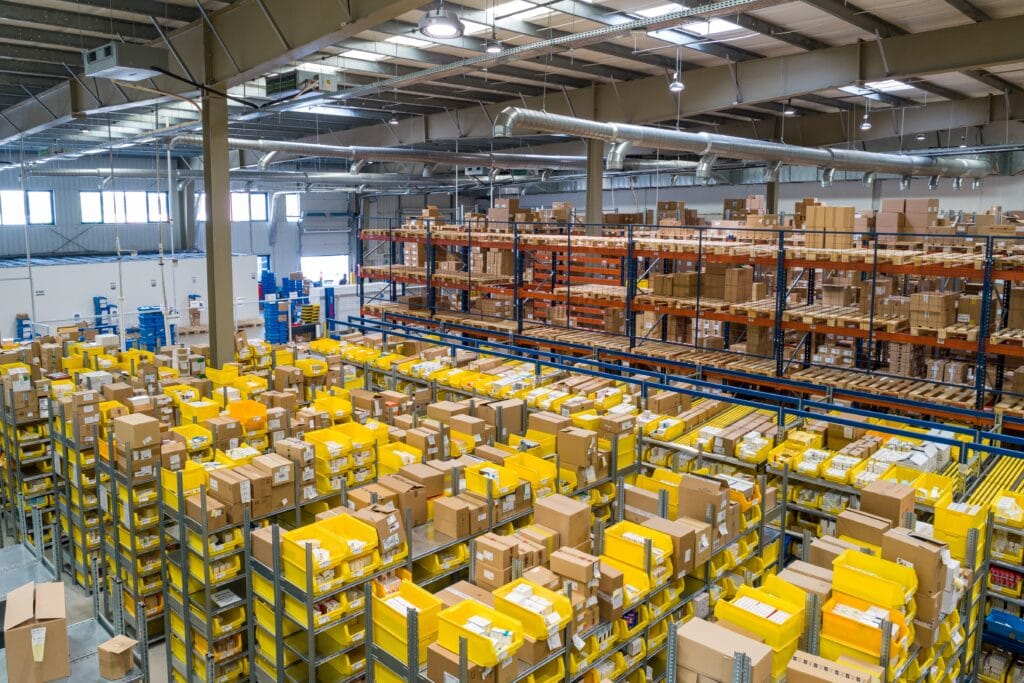Why Is Safety Important In A Warehouse? Warehouses are like the heart of a supply chain, and it brings a tremendous impact on any running business – be it small or large. A good, functioning warehouse is every business owner’s priority.
Warehouse safety is one of the most crucial aspects that concern warehouse owners and their employees alike. A little miscalculation or a bad step can result in devastating injuries and a hefty cost.
Contents
Importance of safety
Warehouses often go months or years without proper maintenance or infrastructure development. As it doesn’t come to the forefront of a business, it doesn’t mean that its importance is secondary. The employees in a warehouse often work under difficult circumstances, even at the risk of physical danger.
Lack of a better infrastructure not only increases the chances of accidents and injuries but can also come in the way of providing an injured person with valuable aids. The absence of space management can create problems while rescuing an injured person.
These situations can pose a legal issue against the company, more precisely about employees’ safety. Taking some security measures can reduce all the risks effectively.
The following tips are necessary to make a warehouse function optimally and safely.
Keeping the employees and the warehouse safe – 07 tips
It is mandatory to have a safety protocol and necessary regulations for every warehouse, and the facility should follow the rules to ensure safe operations.
- Use safety equipment – Warehouse employees need to lift and shift heavy objects all the time; that causes potential harm and injuries. So, using specialized equipment such as forklifts or hydraulic lifts is necessary to avoid such injuries. Also use safety warehouse shoes, safety gears and all other safety precautions.
- Identifying hazardous zones carefully – There are places in most warehouses that have a higher risk of potential accidents. Some equipment also needs careful handling to eliminate such risks. Identifying and marking such hazardous areas, equipment, racks, paths, and emergency exits can save lives in critical situations.
- Fire safety – Fire safety is clearly the most important safety measure a warehouse administration should take. Fire hazards are very common to happen in stuffy places, which eventually lead to loss of lives and huge financial losses. Keeping fire extinguishers at all stations is mandatory, also keeping the space less congested and providing employees’ safety jackets are all important.
- First aid – it doesn’t matter how secure a work environment inside a workplace is; accidents can happen anytime. That is why having a first aid kit facility is mandatory in a warehouse. There are some protocols to follow for everyone. The first aid kit will include bandages, medical gloves, hand sanitizers, antiseptic medicine, scissors, cold packs, etc.
- Infrastructural modifications – A fire breaking out in a warehouse is quite common, but it takes a deadly form because of poor infrastructure. Eventually, that becomes the main reason behind a tragic incident. De-cluttering a warehouse is essential to free up more space. Keeping busy stations clutter-free, keeping the emergency ways open, having a proper exhaust system are some of the steps towards a less hazardous facility.
- Maintenance of equipment – warehouse employees are often susceptible to injuries from machines and equipment. Poorly-maintained equipment can malfunction anytime and cause serious damages to the employees and objects. For example, forklifts can malfunction and drop the object it was carrying, injuring the worker below. Regular inspections and repairs of the equipment can save lives.
- Awareness and training – Lastly, employees must pass through a decent time of training to be prepared for emergencies. Spreading awareness and the importance of basic first aid and CPR is necessary. Knowing how to get out safely in case of a fire or electrical hazard is also imperative. Moreover, basic training about handling faulty equipment or using a fire extinguisher will make the employees feel a bit confident so that they can handle themselves in adverse situations.
The Dangers Of Working In A Warehouse
Working in a warehouse can be physically demanding and hazardous. Workers in this industry face the challenges of dealing with heavy machinery, equipment, and hazardous materials. In this section, we will explore some of the significant dangers that warehouse workers face.
The Physical Demands And Repetitive Motions Of The Job
Warehouse workers have to deal with heavy loads and the constant motion of transporting items. The daily routine involves a lot of bending, lifting heavy packages, and pushing carts. This can lead to injuries such as sprains, strains, and fractures.
Repetitive motion can also lead to musculoskeletal disorders such as carpal tunnel syndrome.
- Workers must maintain a correct posture and take regular breaks.
- Workers should use equipment like back belts or braces to help support their backs.
- Workers should stretch before and after their shifts to prevent injuries.
Heavy Machinery And Equipment
Warehouses can be dangerous due to the sheer number of heavy machines and equipment used daily. Forklift trucks can cause serious injuries and fatalities if not handled correctly. Workers also need to deal with machinery like conveyor belts and automated material handling systems, which can be hazardous if not used appropriately.
- Workers need to understand the correct procedures for using machinery and equipment.
- Workers must ensure that all machinery and equipment are functioning correctly before use.
- Ensure that all safety features and guards function appropriately.
Exposure To Hazardous Materials And Chemicals
Exposure to hazardous materials and chemicals is another significant hazard faced by workers in the warehouse industry. From cleaning substances to chemicals used in manufacturing processes, workers must understand the risks involved with handling these substances and work safely to prevent accidents.
- Proper personal protective equipment (ppe) such as respirators, gloves, and goggles must be worn when working with hazardous materials.
- Label hazardous chemicals or potentially dangerous machinery accordingly.
- Train employees about proper handling, storage, and disposal procedures.
Safety in the warehouse is vital. A safe working environment not only protects the employees but also results in increased productivity, better job satisfaction, and lower absenteeism. Proper training, equipment, and safety protocols can help prevent accidents and keep workers healthy.
Common Workplace Injuries In Warehouses
Warehouse workers are subject to several hazards while on the job, with workplace injuries being a common occurrence. These injuries can include severe cuts, bruises, broken bones, and in some cases, even fatalities. Here are some of the most common workplace injuries in warehouses.
Trips, Slips, And Falls
A warehouse’s fast-paced movement can cause employees to fall and injure themselves. Common causes of such accidents include:
- Wet and slippery floors
- Poor lighting
- Cluttered aisles and walkways
- Uneven or damaged steps
- Improper use of ladders and stairs
Strains And Sprains From Lifting Heavy Items
Warehouse workers are often tasked with lifting, carrying and moving heavy loads. As a result, they are at risk of developing musculoskeletal injuries, such as strains and sprains. Here are some of the most common causes:
- Poor body posture
- Failure to use proper lifting techniques
- Carrying excessively heavy objects
- Using low-quality lifting equipment
Forklift Accidents
Forklifts are an essential tool used in warehouses for transporting goods and materials. However, they can be deadly if not used correctly. Here are some of the most common causes of forklift accidents in warehouses:
- Lack of training and certification of forklift operators
- Using a forklift that is not properly maintained
- Excessive speed while operating the forklift
- Failure to use proper safety equipment
Collisions With Other Workers Or Objects
Collisions with other workers or objects in a warehouse can cause severe injuries. Here are some of the most common causes:
- Inadequate or poorly marked walkways
- Failure to wear high-visibility clothing
- Failure to follow traffic flow patterns in the warehouse
- Distracted or inattentive employees
Safety should be of utmost importance in warehouses to prevent workplace injuries. By implementing proper training, safe work procedures, and the use of personal protective equipment, employers can help minimize the risk of workplace injuries and ensure that their employees remain safe while on the job.
The Direct And Indirect Costs Of Workplace Injuries
When it comes to running a warehouse, safety is a critical concern. There are many reasons to prioritize safety, including the direct and indirect costs associated with workplace injuries.
Workers’ Compensation And Medical Expenses
One of the most significant direct costs of workplace injuries is workers’ compensation and medical expenses. When an employee is injured on the job, the company is typically responsible for covering the cost of medical treatment and any lost wages due to time off work.
- Injuries can result in significant medical expenses that can quickly add up.
- Workers’ compensation claims can also lead to increased insurance premiums.
Lost Productivity And Decreased Morale
Workplace injuries can also result in lost productivity and decreased morale, which are indirect costs that can be just as damaging to a company’s bottom line.
- When employees are injured, it can lead to missed deadlines and delays in projects.
- Long-term injuries can result in decreased morale and increased turnover.
Costs To Replace Injured Workers Or Hire Temporary Workers
Another indirect cost of workplace injuries is the cost to replace injured workers or hire temporary workers.
- Injured employees may need to take extended time off work to recover, leading to a need for temporary workers.
- If an injured employee is unable to return to work, the company may need to recruit and train a new employee, which can be costly.
The direct and indirect costs of workplace injuries can have serious implications for a company’s bottom line. Prioritizing safety in the warehouse can help prevent injuries and minimize these costs.
Things to avoid in a warehouse: Warehouse safety Do’s and Don ts
- It is not advisable to walk without safety boots suitable for warehouse.
- Placing objects or parking equipment very close to an intersection can block ways and make evacuation difficult.
- Never keep the exits congested. That may lead to grave consequences.
- An employee should never operate equipment and vehicles without proper training.
- Over-stacking objects may cause them to fall down and injure employees.
Frequently Asked Questions On Why Is Safety Important In A Warehouse?
What Are The Common Types Of Warehouse Accidents?
The common types of accidents in a warehouse include slips and falls, forklift accidents, falling objects, and improper lifting techniques. These accidents can lead to serious injuries and even fatalities, making it important to prioritize safety in the workplace.
How Can Warehouse Safety Be Improved?
Warehouse safety can be improved by ensuring that all employees receive proper training on safety procedures, implementing safety protocols and guidelines, regularly inspecting equipment and infrastructure, and promoting a culture of safety in the workplace.
Why Is Personal Protective Equipment (Ppe) Important In A Warehouse?
Personal protective equipment (ppe) such as hard hats, safety glasses, and steel-toed boots are important in a warehouse to protect workers from potential hazards such as falling objects, electrical mishaps, and exposure to dangerous chemicals.
Who Is Responsible For Safety In A Warehouse?
Everyone in a warehouse, from management to entry-level employees, is responsible for safety in the workplace. It is important that all employees work together to create a culture of safety and ensure that protocol and guidelines are followed at all times.
What Are The Consequences Of Neglecting Safety In A Warehouse?
Neglecting safety in a warehouse can lead to serious consequences including workplace injuries, fatalities, damaged equipment, and legal liabilities. Prioritizing safety not only protects employees but also prevents financial and reputational damage to the company.
Conclusion
Overall, safety is crucial in any workplace, but particularly imperative in a warehouse setting. With so many potential hazards present, from dangerous equipment to the risk of falling objects and collisions, it’s essential to take all necessary precautions to keep employees safe.
This means investing in quality safety equipment, thoroughly training all workers on proper safety procedures, and continuously monitoring the workplace to identify and address potential hazards. A commitment to workplace safety not only helps protect employees from harm, but also creates a more productive and positive work environment.
By prioritizing safety, employers can build trust with their employees, boost morale, and create a culture where everyone feels valued and supported. At the end of the day, it’s not just the responsible thing to do – it’s the smart thing to do.



8 thoughts on “Why Is Safety Important In A Warehouse?”
Comments are closed.